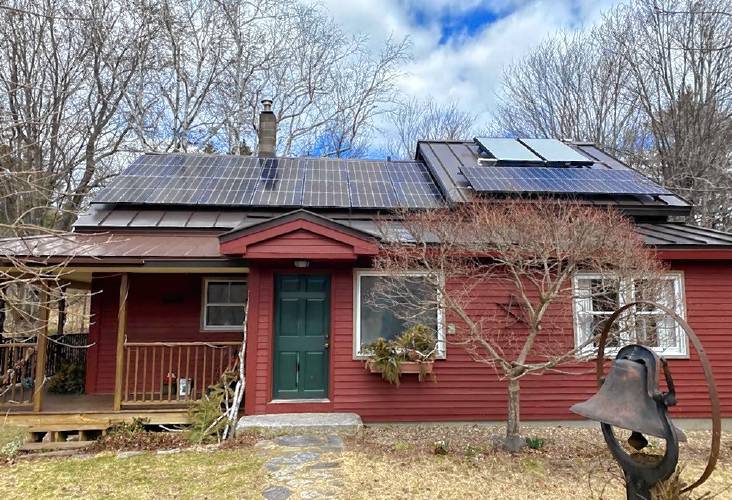Granite Geek: My solar panels won’t think the eclipse is awesome

For a couple hours on April 8, solar panels on homes in southern parts of the state won't be very useful. David Brooks / Monitor staff
| Published: 03-18-2024 5:07 PM |
Like many of you I am really looking forward to next month’s solar eclipse, but there is one small drawback: It will do a number on my solar panels’ output.
For slightly over two hours on April 8, parts of the sun will be blocked by the moon. I live in the Souhegan Valley, where the eclipse starts around 2:20 p.m. and ends around 4:30 p.m., and about 85% of the sun will be covered at maximum. (Concord will have a better show with more than 95% coverage at maximum.)
Early April is a great time for New Hampshire solar power because leaves aren’t fully out on trees, so there are fewer shadows, and temperatures aren’t too warm, which is good because electronics are more efficient when it’s chilly. Last April 8, for example, I generated 38 kilowatt-hours of electricity, which is very close to the most I’ve ever produced from my 5 kW rooftop array.
Over the course of the year, if you’re curious, I cover all the electricity I use with those panels, plus getting hot water from solar thermal panels. But I’m still a greenhouse gas sluggard since I have oil heat and a propane stove and an internal-combustion car; one step at a time.
Because of my home’s orientation and some trees, my springtime solar output starts to decline around 2:15 p.m. even without an eclipse. Taking this into account, I estimate that the eclipse will reduce my day’s electricity production by about 10% unless it’s cloudy, in which case the production will already be low and not affected as much.
This isn’t a big hit – at most I lose 40 cents worth of electricity – but it’s not nothing, either. When you start adding it up you see why utilities are taking note.
In New England in springtime, for example, it’s not uncommon to see rooftop solar plus utility solar producing almost as much electricity as natural-gas-fired plants in early afternoon. Losing a big part of that for a short period requires preparation, such as making sure that power plants which normally turn off in midday are ready to turn on again.
“For context, during the partial eclipse on October 14, 2023, the sun was only covered by 10% to 20% and resulted in a drop in solar production of several hundred megawatts,” ISO-New England, the folks who oversee the six-state power grid, wrote in a prepared statement. A megawatt, or one million watts, is roughly the amount of electricity used by 800-ish New England homes. “The exact amount of additional generation needed will depend on cloud cover that day. Further, solar production will ramp back up as the eclipse concludes, meaning that additional generation will need to be carefully reduced to maintain system balance.”
Article continues after...
Yesterday's Most Read Articles
 With Concord down to one movie theater, is there a future to cinema-going?
With Concord down to one movie theater, is there a future to cinema-going?
 “It’s beautiful” – Eight people experiencing homelessness to move into Pleasant Street apartments
“It’s beautiful” – Eight people experiencing homelessness to move into Pleasant Street apartments
 No deal. Laconia buyer misses deadline, state is out $21.5 million.
No deal. Laconia buyer misses deadline, state is out $21.5 million.
 Quickly extinguished fire leaves Concord man in critical condition
Quickly extinguished fire leaves Concord man in critical condition
 Concord police ask for help in identifying person of interest in incidents of cars being keyed during Republican Party event
Concord police ask for help in identifying person of interest in incidents of cars being keyed during Republican Party event
 Update: Victim identified in Lantern Lane fire in Concord
Update: Victim identified in Lantern Lane fire in Concord
They’re more worried in Texas, where the full eclipse sweeps through the entire state and where they have a lot of solar power rarely dimmed by April clouds. The folks running the grid there estimate solar production will drop from nearly 15,000 megawatts – more power than all of New England has used at any given time so far this month – to around 1,000 megawatts during the eclipse. That’s a lot of electricity to lose for a short period of time.
Such variability is, of course, the big drawback to solar power even when there’s no eclipse. (Free fuel is its big advantage.) Electrical storage to fill in the gaps, from a backup battery in your garage to utility-scale battery farms to seasonal storage like pumped hydro, let us overcome the variability and profit from the free fuel.
As for the April 8 eclipse, organizations far and wide are putting together events in advance of the eclipse or on the day itself; a half-dozen announcements have landed in my inbox in the past few days.
The state Department of Travel and Tourism is gathering up many of them at its Solar Eclipse site, visitnh.gov/solareclipse but it won’t hurt to do some online searching in case locals haven’t done a good job with publicity.


 Voice of the Pride: Merrimack Valley sophomore Nick Gelinas never misses a game
Voice of the Pride: Merrimack Valley sophomore Nick Gelinas never misses a game With less than three months left, Concord Casino hasn’t found a buyer
With less than three months left, Concord Casino hasn’t found a buyer Kearsarge Middle School drone team headed to West Virginia competition
Kearsarge Middle School drone team headed to West Virginia competition Phenix Hall, Christ the King food pantry, rail trail on Concord planning board’s agenda
Phenix Hall, Christ the King food pantry, rail trail on Concord planning board’s agenda
